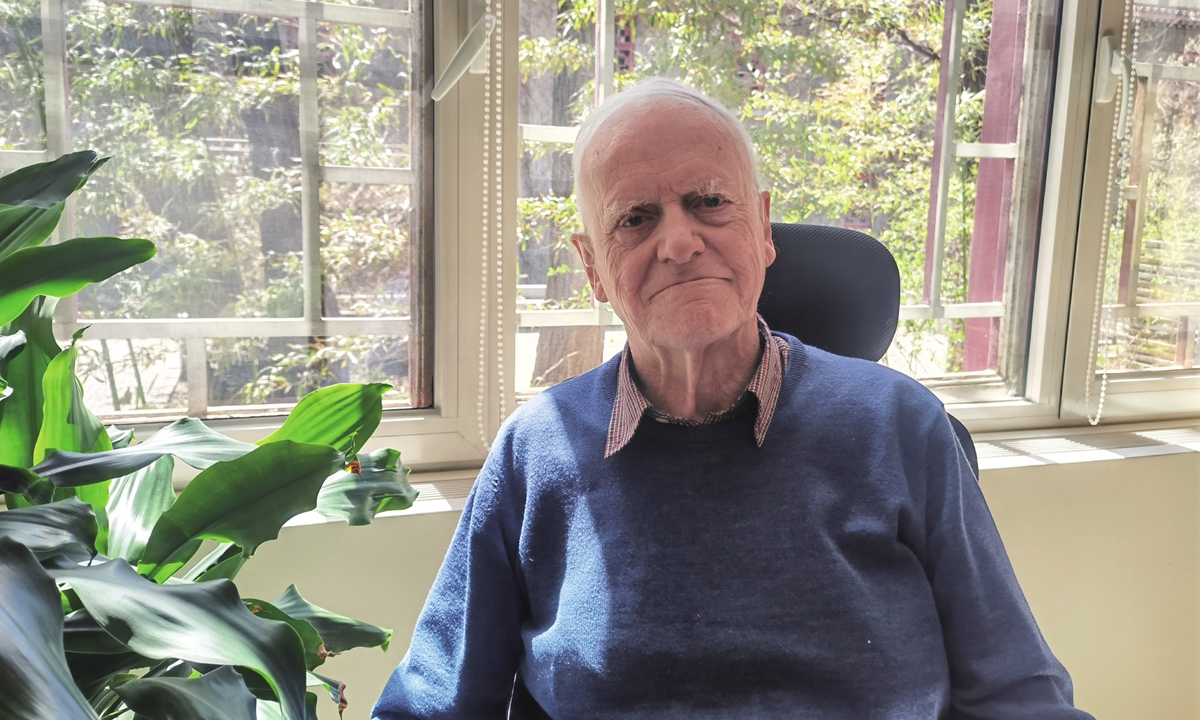
Anthony Carty. Photo: Wang Wenwen/GT
As the Philippines celebrated the so-called "8th anniversary" of the illegal South China Sea Arbitration Award with Western allies on Friday, Anthony Carty, an Irish scholar of international law and author of The History and Sovereignty of the South China Sea Islands, told the Global Times that the Philippines has no right to claim sovereignty over the South China Sea, and archival evidence supports China's claims over a number of islands.
"I don't see why on earth or how the Philippines can claim any sovereignty over any islands in the South China Sea. The French archives, the British archives, the Chinese archives, the American archives, and the Japanese archives are all agreed that the Filipinos have no territorial claim," said Carty.
"I don't understand why they [the Philippines] would want to bring or how they could bring a claim that the reefs 'belonging to them' would be damaged, because that would directly involve a question of sovereign title, and there is no compulsory jurisdiction under article 86 of the United Nations Convention on the Law of the Sea. Because it is a law of the sea convention and a territorial title would not be adjudicable."
Carty, an expert in international law, believes that China should maintain its stance and that its legal position is justified.
His book presents extensive historical evidence backing China's sovereignty claims over the islands in the South China Sea.
His research delved into the archives of the French and British foreign ministries, spanning the period from the 1880s to the late 1970s. The findings revealed a consensus among legal experts from both countries, indicating that the Xisha and Nansha Islands rightfully belong to China, the Xinhua News Agency reported.
According to the expert, the so-called South China Sea arbitration of 2016 is a "chaotic and manipulative use of international law," "a case of double standards," and "a legal trick."
The scholar does not believe the international judiciary behaved objectively. "The political considerations will always come into play, which is why, as I've already stated, Carlo Santulli, the director of the Paris Institut des Hautes Etudes Internationales, said the 2016 tribunal is obviously a NATO tribunal," he told the Global Times.
"One is basically relying upon the idea that the judges are appointed by countries. The tribunal in 2016 had a German judge, a French judge, a Dutch judge and a Polish judge and then an African chair person. They may not be in any way consciously biased, but inevitably they're colored by the countries that they come from. So the whole idea of international adjudication is problematic," Carty noted.
The law professor highlighted that Washington has been trying to uphold its dominance and create instability in the Asia-Pacific region by using its regional allies to provoke China in the South China Sea.
"There is absolutely no doubt that this whole dispute is entirely about the Americans trying to make life difficult for the Chinese. The aggression that is building up against China and the scapegoating of China by the whole of the so-called democratic community of the world is appalling," he told the Global Times in a previous interview.
It is obvious that the US has been interfering with and shaping Filipino policies, he noted.
The argument about China being an "assertive and aggressive" power and a "revisionist" power in some Western or Philippine narratives is simply "slanderous abuse," he said.
"And it's very worrying because it definitely implies a willingness on the part of the West to use force against China. It represents a complete collapse of any kind of civilized diplomacy," he said.




